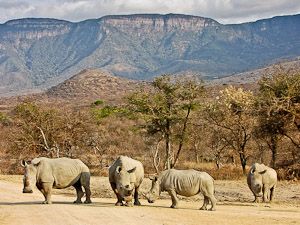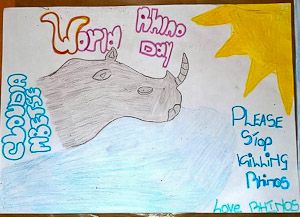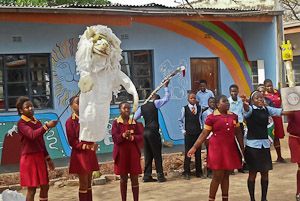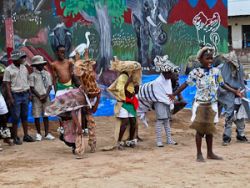

Seeds of Light began when Leslie Temple-Thurston went for what turned out to be a fateful trip to the Greater Timbavati Region and encountered numerous children who had been orphaned by the AIDS epidemic. Thurston decided immediately to take action and help support the children and uplift the community.
Becky Harmon, director of Seeds of Light, describes the area as very poor with high rates of unemployment and HIV. "There is a strong need to build conservation awareness for the environment, natural resources and wildlife among indigenous people and students in this region," Harmon said.
Seeds of Light is the humanitarian service arm of CoreLight, an international non-profit organization. Their mission is simple: to assist with the awakening of the global heart through humanitarian service. "We perceive the global heart to be interconnectedness of all life through tolerance, equality and compassion," said Harmon. Seeds of Light's tagline, "Love in Action," permeates everything the organization does."We know that love in action is the most powerful response to what we see transpiring in our world," she said. "Our goal is to be responsive to the urgent crises that might arise in the coming times."In addition to working to improve the overall health of AIDS orphans and vulnerable children, Seeds of Light also focuses on preserving endangered species and ecosystems that surround the area, including the elusive white 
Seeds of Light has three main focuses: outreach, which includes school-based programs, community empowerment and scholarship programs. Education action programs develop partnerships with schools to offer better and more advanced curricula for children. With the help of scholarships alleviating expenses and fees, promising students are able to further their education. Empowerment programs strive to uplift communities by providing various means of support for infrastructure and family involvement. Previous programs include drilling wells, creating sustainable vegetable gardens, HIV/AIDS education and skills training, opening a medical clinic,and establishing computer centers and libraries, as well as providing access to clean water.
Eco Club, an educational program, provides children with interactive lessons incorporating poetry, art, theater and dance to provide information on topics such as biodiversity, water conservation,waste and pollution. Three local schools are part of the project, which was developed by the Global White Lion Protection Trust (WLT). "Eco Club uses the symbol of the white lion as a central theme [based] around creating conservation awareness and fostering a sense of purpose, self-esteem and leadership among learners," Harmon said.

Many visitors to the events were excited to see the melding of old traditions and new ideas. "There was such a sense of harmony here today, "said one local reveler. Rhino Day promoted youth education about local biodiversity and how the killing of rhinos for their horns negatively affects both the natural world and their own cultural heritage. Rhinoceros poaching in South Africa has increased more than 70 percent in the last two years. The animals' horns are believed to possess cancer-curing properties and are often used in traditional Asian medicine.
Harmon believes the species is heading toward extinction due to misinformation and false beliefs. She said that to prevent further loss, we need to teach children in the area about the myths and dangers of these practices."We want the children to grow up to be informed citizens and have an understanding of the importance of each distinct part of the larger ecosystem," Harmon said. Children participating in Rhino Day drew pictures to support rhino conservation. The class provided the youth with new knowledge about why this charismatic species should be saved. "Before today, I didn't really understand what was happening with rhinos and why we need to protect them," said one of the children who participated in the day's events. Now I know more, and will do what I can to help."
By implementing early conservation education, Harmon says learners will take an academic interest in the fields of wildlife conservation and environmental sustainability. To find out more about Seeds of Light and their unique educational and environmental projects, please visit Seeds of Light.
Photos are copyright protected and may not be reproduced without permission. Photos are used with the permission of Becky Harmon and Seeds of Light.